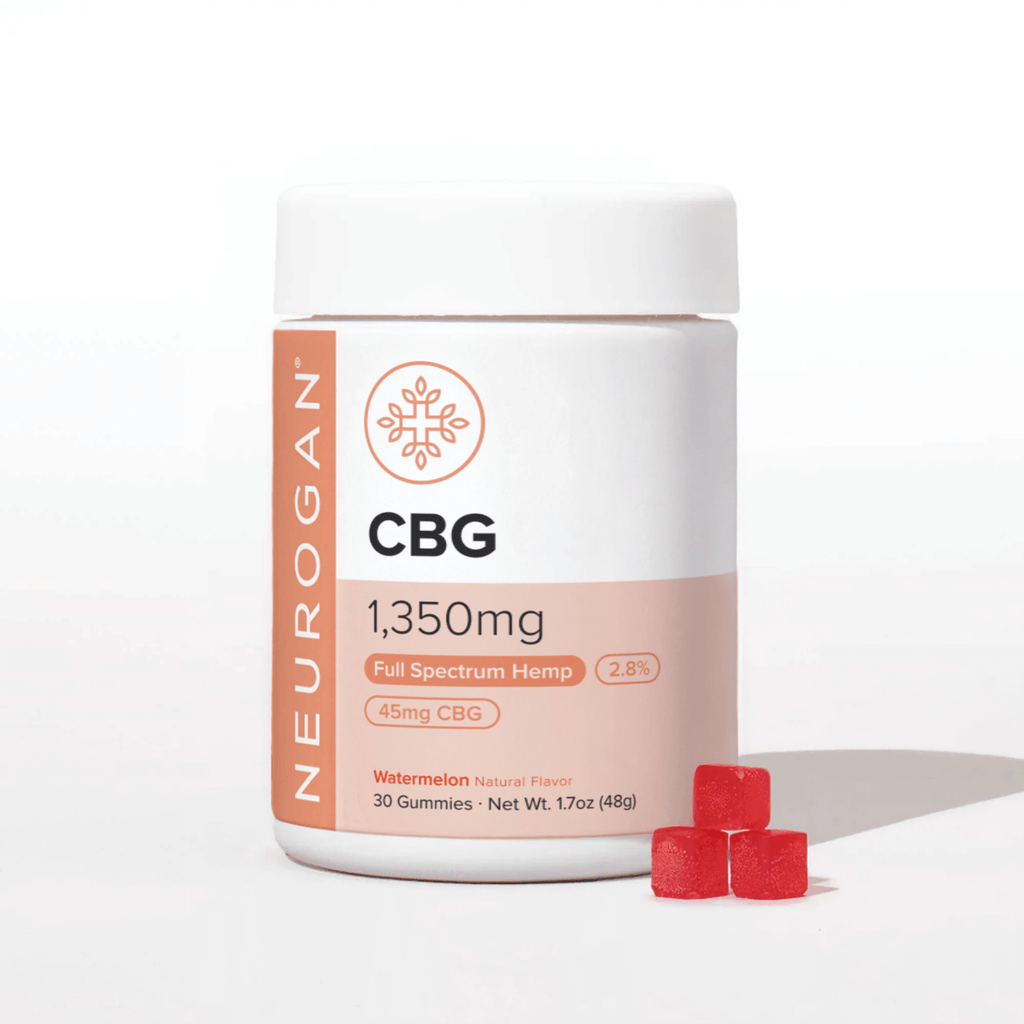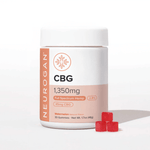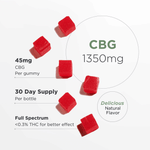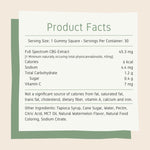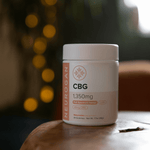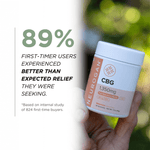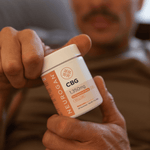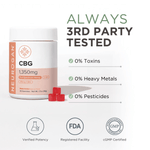Cannabigerol (CBG) from cannabis has been looked at as possible ADHD support. Preclinical studies suggest that its mood-uplifting properties and positive effects on focus and concentration may help those with attention deficit hyperactivity disorder (ADHD).
And while the research isn’t definitive, there are a lot of people online who can attest to CBG use having improved their ADHD conditions. We just want to make it clear that this article isn’t meant to convince you to swap out your medications for CBG products — please follow the guidance from your healthcare professional.
This article is for educational purposes only and is not meant to replace medical advice.
How Can CBG Help ADHD?
CBG may support ADHD management through its unique properties and interaction with the endocannabinoid system, which regulates focus, mood, and motivation. In studies, CBG acts as a partial agonist at CB1 and CB2 receptors, influencing the ECS to support better regulation of neural activity and stress responses.
One of the ways CBG may help ADHD symptoms is by modulating dopamine levels [1].
Dopamine is a hormone that’s also involved in attention, motivation, and reward processing. Imbalances in dopamine signaling are a hallmark of ADHD. CBG’s potential to enhance dopamine activity might be one of the reasons why people find that it helps with focus and reducing impulsivity.
CBG also has potential neuroprotective and anti-inflammatory properties, which may improve overall brain function and reduce oxidative stress, supporting mental clarity [2]. By regulating neurotransmitter release and promoting balance within the ECS, CBG may address core symptoms of ADHD.
How Much CBG to Take to Help with ADHD?
There’s no standard CBG dosage for ADHD because it’s not a medication approved for this condition.

That being said, the dosing for CBG tends to depend on weight. A common starting point for CBG is 5–10 mg per day, gradually increasing to 20–50 mg or more if needed.
It’s best to start with a low dose and adjust based on how you feel. Consulting with a healthcare professional can help determine the right dosage and ensure safe use tailored to your needs.
Research on CBG for ADHD
People with ADHD, often struggle with lower dopamine levels. This often negatively impacts their sense of reward and motivation. Researchers believe that phytocannabinoids, like CBG, may help balance healthy dopamine concentrations, which may support symptoms of ADHD [1].
A study showed that CBG helped protect brain cells in a lab test. It reduces inflammation and stress in the cells, which could help with brain health problems [2].
ADHD isn’t classified as a neurodegenerative disease. However, some research suggests that ADHD might be associated with structural and functional differences in certain brain regions, such as the prefrontal cortex, basal ganglia, and cerebellum, which are involved in attention, executive function, and impulse control.
Chronic stress, poor sleep, or untreated ADHD symptoms could potentially lead to secondary effects that may impact brain health over time, like reduced neuroplasticity or increased vulnerability to other cognitive conditions.
ADHD itself doesn’t directly cause neurodegeneration, but managing symptoms and maintaining brain health can support long-term cognitive well-being.
CBG Testimonials
While the limited research we do have is promising, many people with ADHD are turning to CBG for support due to the anecdotal evidence consumers are posting on forums like Reddit.
One user posts, “ADHD is the worst. I find that my thought process is slowed down a little and operates more efficiently when on CBG.”
Another user agrees with this sentiment, “Yes, I have ADHD and many other issues and I love CBG. I take CBG and CBD isolate together several times a day. It helps me with mood, focus and motivation.”
For some people with ADHD, CBG alone wasn’t supportive enough for them.
Mixing CBG with other cannabinoids can be more effective for some, including this user: “Currently using green flowers with a ratio of 3:1:2,5 (thc:cbd:cbg). To achieve this ratio, I mix medical THC flowers (50%/50% Ghost Train Haze/Headband) with CBD-only and CBG-only flowers. My personal dosages for focus and daytime productivity are approximately: 7.5mg THC/2.5mg CBD/6.25mg CBG — which is absolutely working wonders for me! Hope someone searching for a solution is helping this out. My life has been drastically improved since being on this combination and I was able to graduate in the medical field with an adhd brain that was tamed and highly functionalized by this medication regimen.”
Our own customers leave reviews for our CBG products to let us know how CBG has impacted their ADHD.

In a review for our 12000 mg CBD + CBG Balance Oil, Smith Walsh wrote, “I have ADHD and stumbled upon this, and it’s astonishing how effective it is. Today, I could concentrate on a video game for an extended period, played for more than an hour straight. I even watched a movie without constantly reaching for my phone.”
Similarly to one of the Reddit posters, Maksym Stef thought a combination of cannabinoids is effective, “CBG is good, but CBD + CBG is way better for me. So far the most relief from my ADHD and anxiety I have had!”
As you can see, everyone’s response to CBG is highly individualized. Some like a full spectrum combination formula, while others prefer a simpler CBG formula. Some testimonies report playing around with dosages and formulas until they found an effective routine. Testimonies like these encourage further research into the medical potential CBG offers for disorders such as ADHD.
CBG for ADHD
CBG and its benefits show promise as a natural option for supporting ADHD symptoms. By interacting with the endocannabinoid system, CBG may help improve focus, reduce hyperactivity, and promote a sense of calm.
Unfortunately, ADHD medications have become known for their adverse side effects, which has led many to seek effective options with fewer side effects. While some formulas that include THC may not be legal in all 50 states, most CBG products are legal across the U.S and you can purchase CBG on dispensaries near you or online.
Treating ADHD can be complicated and requires a multifaceted plan. Developing a plan with a healthcare professional that involves CBG may provide the support you’re seeking to manage your ADHD symptoms.
References
-
Dawson, D. A., & Persad, C. P. (2021). Targeting the Endocannabinoid System in the Treatment of ADHD. Genet Mol Med, 3(1), 1-7.
-
Gugliandolo, A., Pollastro, F., Grassi, G., Bramanti, P., & Mazzon, E. (2018). In vitro model of neuroinflammation: efficacy of cannabigerol, a non-psychoactive cannabinoid. International Journal of Molecular Sciences, 19(7), 1992.



